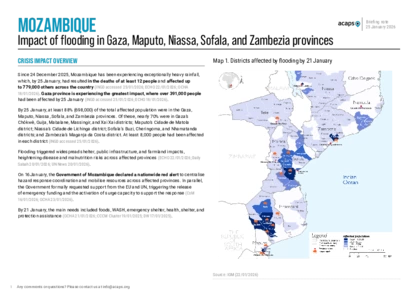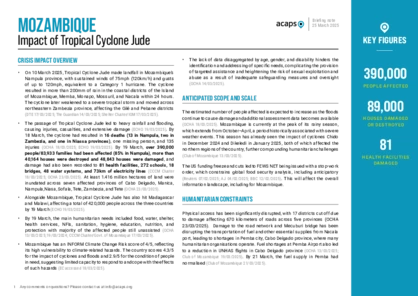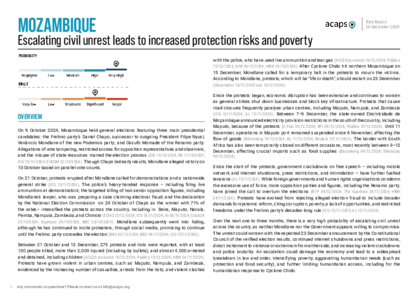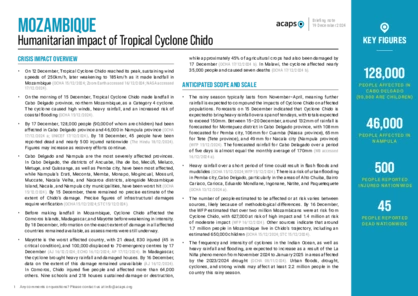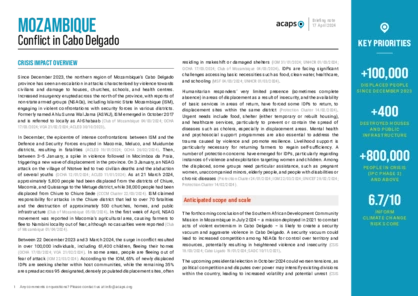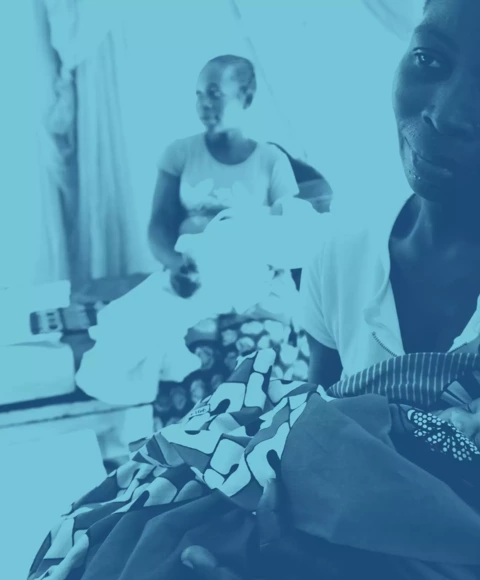Latest updates on country situation
27 January 2026
Since the beginning of the rainy season (typically from October–March), Heavy rainfall from 24 December 2025 to 26 January 2026 caused severe flooding across Mozambique, with the worst impacts in Gaza, Inhambane, Maputo, and Sofala provinces. By 28 January, the impact had affected over 800,000 people countrywide, with nearly half displaced and staying in 123 evacuation centres or with hosts and relatives. Northern Mozambique faces further flood risks from forecast heavy rains. Urgent needs include shelter, WASH, food assistance, and rescue support. (ECHO 27/01/2026, INGD accessed 28/01/2026, OCHA 23/01/2026)
02 December 2025
Between 10–17 November, attacks by non-state armed groups in Memba, Nampula province, led to a surge in displacement. By 3 December, over 107,000 people had been displaced across multiple districts. Overcrowded sites, including Alua Sede, Alua Velha, Mecufi, and Miliva, are experiencing worsening conditions in shelter, water, sanitation, and health. The majority of those displaced are children, and the risks to their safety are increasing as new arrivals overwhelm already stretched humanitarian resources.
(IOM 03/12/2025, IOM 27/11/2025)
25 November 2025
Between 10–17 November 2025, non-state armed group (NSAG) attacks in Memba district, Nampula province, displaced nearly 72,000 people to Erati district and others towards Nacala and Mecufi. The violence (civilian killings, abductions, and the destruction of homes, schools, health facilities, and churches) compounded trauma from October attacks. This marks another escalation in displacement within Nampula province, following recurrent NSAG attacks that have already displaced thousands, straining humanitarian response capacity. Displaced populations face severe conditions in critically overcrowded major shelters (Alua Sede: 49,924; Miliva: 8,895; Alua Velha: 13,164), while others remain in makeshift structures or open areas, exposed to harsh weather and health risks. The displaced – predominantly children (67%) and women (18%) – face acute protection risks, including gender-based violence, child recruitment, trafficking, school dropout, and family separation in overcrowded sites lacking adequate protection services. Humanitarian priorities include food, emergency shelter, WASH services, healthcare, protection assistance, and NFIs. (OCHA 20/11/2025, WVI 21/11/2025, IOM 24/11/2025)
14 October 2025
By October 2025, the conflict in Cabo Delgado since 2017 had affected all 17 districts of Mozambique and displaced around 1.3 million people. Between July–October alone, over 77,000 people fled renewed violence by non-state armed groups in northern Mozambique, including nearly 40,000 displacements between 22 September and 6 October across Cabo Delgado and neighbouring Nampula. Women and children make up 80% of those displaced, with most accommodated in host communities and a smaller proportion in official resettlement sites. The violence has also spread to Memba district in Nampula province, where abductions and targeted assaults on civilians and public infrastructure have been reported. Homes have been burnt, and a school and a health centre have been destroyed. Worsening insecurity has significantly disrupted humanitarian operations, leading UN agencies to suspend planned Joint Response Plan activities in Nangade on 11 October. Affected people urgently need food, shelter, NFIs, and protection. (IOM 09/10/2025, ECHO 13/10/2025, OCHA 10/10/2025)
16 September 2025
Between April–September 2025, around 2.09 million people faced acute food insecurity, including 143,000 in Emergency (IPC Phase 4) levels and more than 114,000 acutely malnourished children. From October 2025 to March 2026, the number of food-insecure people is projected to rise to 2.67 million, driven by depleted food reserves, irregular rainfall, and continued conflict and displacement, with 170,000 expected to experience IPC 4. (IPC 11/09/2025)
13 August 2025
Attacks by non-state armed groups from 20 July to 3 August 2025 in Ancuabe, Chiure, and Muidumbe districts of Cabo Delgado displaced over 57,000 people – the largest spike so far in 2025. The majority of displacement occurred in Chiure district, where homes and critical infrastructure were damaged or destroyed. The displaced population is sheltering in schools or with host families, with urgent needs. Humanitarian access remains highly constrained, with reports of ransom demands on trucks and the looting of aid intended for assisting the displaced, 58% of whom are children. Children separated from their families face heightened risks of violence, exploitation, and abuse. Severe education disruptions in Cabo Delgado elevate child protection risks. Recent attacks have led to the closure of 87 schools in Chiure district, affecting 48,000 students and 490 teachers, according to government sources. This is alongside the 117 schools that remain closed in Cabo Delgado. (STC 08/08/2025, IOM 05/08/2025, MNA 08/08/2025)
04 August 2025
From 24–30 July 2025, escalating violence by non-state armed groups displaced over 49,000 people from the Chiure Velho administrative post to Chiure Sede, Cabo Delgado. Most of the displaced, primarily women and children, are in transit centres or with host communities. Urgent needs include food, shelter, NFIs, and clean water. (CCCM Cluster 31/07/2025, UN 03/08/2025)
current crises
in
Mozambique
These crises have been identified through the INFORM Severity Index, a tool for measuring and comparing the severity of humanitarian crises globally.
MOZ012 - Drought
Last updated 27/01/2026
Drivers
Drought/drier conditions
Crisis level
Country
Severity level
3.3 High
Access constraints
2.0
MOZ001 - Multiple Crises
Last updated 27/01/2026
Drivers
Conflict/ Violence
Cyclone
Drought/drier conditions
Crisis level
Country
Severity level
3.6 High
Access constraints
3.0
MOZ004 - Conflict in Cabo Delgado
Last updated 27/01/2026
Drivers
Conflict/ Violence
Crisis level
Country
Severity level
3.4 High
Access constraints
3.0
Analysis products
on
Mozambique
25 January 2026
Mozambique: impact of flooding in Gaza, Maputo, Niassa, Sofala, and Zambezia provinces
DOCUMENT / PDF / 829 KB
This report provides an overview of flooding and its humanitarian impacts in Mozambique. The report aims to inform the humanitarian community of both the immediate and mediumterm impacts of flooding in Mozambique’s most affected provinces and support response operations.
25 March 2025
Mozambique: impact of tropical cyclone Jude
DOCUMENT / PDF / 263 KB
The passage of Tropical Cyclone Jude led to heavy rainfall and flooding, causing injuries, casualties, and extensive damage. By 18 March, the cyclone had resulted in 16 deaths, one missing person, and 135 injuries. By 19 March, over 390,000 people had been affected (85% in Nampula), and more than 89,000 houses were destroyed or damaged.
20 December 2024
Mozambique: Escalating civil unrest leads to increased protection risks and poverty
DOCUMENT / PDF / 260 KB
This report provides an analysis of the risk of escalating civil unrest in Mozambique following the general elections on 9 October 2024. The report provides a brief of the current context in the country, identifies the factors that could lead to further civil unrest, and outlines key impacts should such a risk materialise, including effects on humanitarian operations.
19 December 2024
Mozambique: humanitarian impact of Tropical Cyclone Chido
DOCUMENT / PDF / 298 KB
On the morning of 15 December, Tropical Cyclone Chido made landfall in Cabo Delgado province, northern Mozambique, as a Category 4 cyclone. The cyclone caused high winds, heavy rainfall, and an increased risk of coastal flooding. By 17 December, 128,000 people (90,000 of whom are children) had been affected in Cabo Delgado province and 46,000 in Nampula province.


